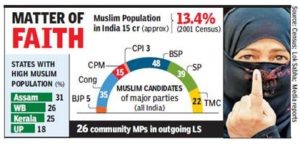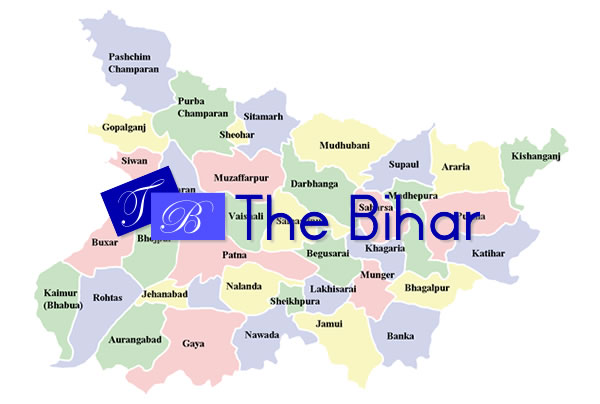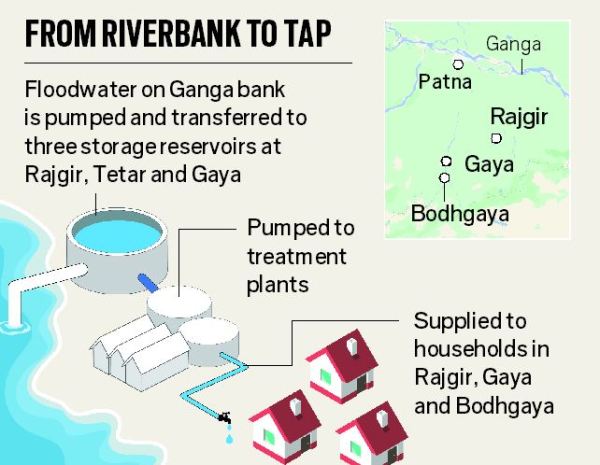Parties don’t walk the talk on Muslim candidates
2 min read With 117 constituencies going to the polls on April 24, the Muslim community is in focus. This is because many areas with a high Muslim population are voting in this round. These include the constituencies in Lower Assam, northcentral Bengal (around Malda), northeastern corner of Bihar, northern Maharashtra and one in Kashmir. Of the 35 constituencies estimated to have over 30% Muslim voters, at least 20 are polling on April 24. Making a determined bid for power this time, the BJP appears to be at a disadvantage in this round because it has just one Muslim candidate — Shahnawaz Hussein in Bhagalpur. In fact, he is its only Muslim candidate in the country apart from four others in constituencies with near 98% Muslim voters – three in Jammu & Kashmir, and one in Lakshadweep.
With 117 constituencies going to the polls on April 24, the Muslim community is in focus. This is because many areas with a high Muslim population are voting in this round. These include the constituencies in Lower Assam, northcentral Bengal (around Malda), northeastern corner of Bihar, northern Maharashtra and one in Kashmir. Of the 35 constituencies estimated to have over 30% Muslim voters, at least 20 are polling on April 24. Making a determined bid for power this time, the BJP appears to be at a disadvantage in this round because it has just one Muslim candidate — Shahnawaz Hussein in Bhagalpur. In fact, he is its only Muslim candidate in the country apart from four others in constituencies with near 98% Muslim voters – three in Jammu & Kashmir, and one in Lakshadweep.
Even in Kishanganj, Bihar, where Muslim voters make up the majority of the electorate, the BJP couldn’t select a Muslim candidate from its supporters. While BJP supporters try to suggest this is because their candidates will effectively represent all communities in a constituency, other observers argue this lack of Muslim candidates is because the BJP neither has sufficient support among the minority community to throw up an effective candidate nor does it have the inclination for it. Many commentators believe the BJP is, in fact, comfortable with not having Muslim candidates because then it can consolidate all Hindu votes in a polarized battle. This experiment has been successfully tried by the BJP in Seemanchal Bihar (north-east Bihar going to polls on April 24) where it won several high Muslim population seats (except Kishanganj).
But not having a Muslim candidate in states with big minority population like Assam (31%), West Bengal (26%), Kerala (25%) and Uttar Pradesh (18%) doesn’t sit well with the party’s attempt to show itself as uniting all communities is concerned. This may also confi rm the minority community’s distrust of the saffron party, which is in damage control mode after anti-Muslim outbursts by its state leaders and associated organizations.
Amit Shah, BJP general secretary and handpicked by Narendra Modi to manage the campaign in UP, has apologized to the Election Commission for calling on voters to take revenge for the humiliation they supposedly suffered in the communal violence in Muzaffarnagar last year.
But Giriraj Singh, a BJP candidate from Jharkhand, reignited the controversy by openly declaring that those who do not support Modi should go to Pakistan. Then Praveen Togadia, president of the Vishwa Hindu Parishad, led demonstrators to a Muslim home in Bhavnagar and called for resistance to Muslims buying property in so-called Hindu colonies. There are an estimated 73 parliamentary seats with over 20% Muslim population and another 145 seats with 11%-20% Muslim population. Overall, Muslims constitute some 13.4% of India’s population according to the 2001 Census. The data from Census 2011 on religious composition of population is not yet out but it would be roughly of the same order.
Courtesy: TNN


